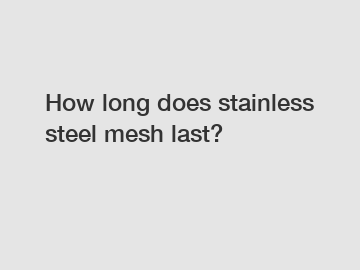How long does stainless steel mesh last?
Stainless steel mesh is a versatile and durable material that is used in a wide range of applications, from industrial filtration and separation to architectural design and construction. Its longevity and resistance to corrosion make it a popular choice for many projects, but just how long does stainless steel mesh actually last?
The short answer is: a long time. Stainless steel mesh is known for its exceptional durability and longevity, thanks to its unique composition and properties. Stainless steel is an alloy made up of iron, chromium, nickel, and other elements, which gives it its signature resistance to rust and corrosion. This makes stainless steel mesh ideal for outdoor and high-humidity environments where other materials may deteriorate over time.
In fact, stainless steel mesh can last for decades with proper care and maintenance. Its resistance to corrosion means that it can withstand exposure to moisture, chemicals, and extreme temperatures without losing its strength or integrity. This makes stainless steel mesh a cost-effective and reliable choice for long-term projects that require a sturdy and long-lasting material.

One factor that can affect the lifespan of stainless steel mesh is the grade of stainless steel used. There are different grades of stainless steel, each with its own properties and characteristics. The most common grades used for mesh are 304 and 316 stainless steel, which are both known for their corrosion resistance and durability.
304 stainless steel is a versatile and widely used grade that is suitable for most applications. It is resistant to corrosion from most chemicals and environmental conditions, making it a popular choice for general-purpose mesh. 316 stainless steel, on the other hand, is a higher-grade alloy that contains more chromium and molybdenum, which enhances its corrosion resistance and durability. It is often used in more demanding applications where the mesh will be exposed to harsh chemicals or high temperatures.
The grade of stainless steel mesh you choose will depend on the specific requirements of your project and the environmental conditions it will be exposed to. In general, higher-grade stainless steel will have a longer lifespan and require less maintenance than lower-grade stainless steel. However, all grades of stainless steel mesh are known for their longevity and durability, so you can expect your mesh to last for many years regardless of the grade you choose.
Proper care and maintenance are also important factors in ensuring the longevity of stainless steel mesh. While stainless steel is highly resistant to corrosion, it is not completely immune to damage. Regular cleaning and inspection can help prevent the buildup of dirt, debris, and other contaminants that can compromise the integrity of the mesh. In high-corrosion environments, such as coastal areas or industrial settings, more frequent maintenance may be required to ensure the continued performance of the mesh.
In conclusion, stainless steel mesh is a durable and long-lasting material that can withstand the test of time with proper care and maintenance. Its resistance to corrosion and high temperatures make it a popular choice for a wide range of applications, from industrial filtration to architectural design. Whether you choose 304 or 316 stainless steel mesh, you can expect it to last for decades and provide reliable performance in even the most demanding environments. So next time you’re planning a project that requires strength, durability, and longevity, consider using stainless steel mesh for a solution that will stand the test of time.
For more expanded mesh fence, wholesale perforated metal, architectural mesh exporterinformation, please contact us. We will provide professional answers.



